The Royal College of Art has announced the three winners of the RCA Grand Challenge 2023/24: Ocean & Cities as an exhibition of the shortlisted entries opens at the RCA Battersea campus.
Students across the RCA’s School of Design are exploring London as a coastal city using co-design and place-based approaches with local communities to address complex and urgent challenges. The RCA Grand Challenge 2023/24 is part of the RCA’s work as a UNESCO Ocean Decade Implementing Partner, supporting efforts to reverse the cycle of decline in ocean health.
The RCA Grand Challenge 2023/24: Ocean & Cities brings London closer to the ocean, exploring a wide range of design challenges at the interface of land and sea. Students defined specific challenges to address, from the protection of marine ecosystems and flood mitigation to sustainable fishing and increased ocean literacy. In January, 140 student teams partnered with communities across each of London’s 32 boroughs and the City of London to engage with different forms of ocean science. The projects support behaviour change among citizens and organisations through the use of ocean science, co-design and place-based approaches to address the impacts of cities on the ocean and increase city resilience to ocean-related impacts of climate change.
The shortlisted projects will then be displayed as an exhibition entitled ‘The Grand Challenge: Designing for Ocean & Cities’ at the Museu de Ciències Naturals de Barcelona as part of the 2024 Ocean Decade Week, happening in Barcelona from 8 to 12 April.
These creative design proposals demonstrate the effectiveness of a community-centred approach to design and address a range of topics including flood mitigation, sustainable packaging in collaboration with the seafood industry, and reducing fatbergs in sewage systems.
The RCA Grand Challenge is the biggest single-institution postgraduate design project in the world. This year, close to 700 students are taking part from Master’s programmes as diverse as Design Products, Fashion, Innovation Design Engineering, Intelligent Mobility, Service Design and Textiles. Students are briefed to tackle key global challenges through collaboration, and by responding to social, cultural, and economic factors as well as science and technology.
The three winning projects were chosen by a judging panel including representatives from the RCA, UNESCO, the National Oceanography Centre, Wandsworth Council and the UK Government’s Department for Environment, Food and Rural Affairs.
The winning projects are:
FIRST PLACE: Thames Mussel Conservation Centre and Barking Barges
Designed by Keerthi Pradaa Balajee (MA/MSc Innovation Design Engineering), Jinglei Cao (MA Service Design), Yiming Pan (MA Fashion), Thomas Scrimgeour (MA Design Products).
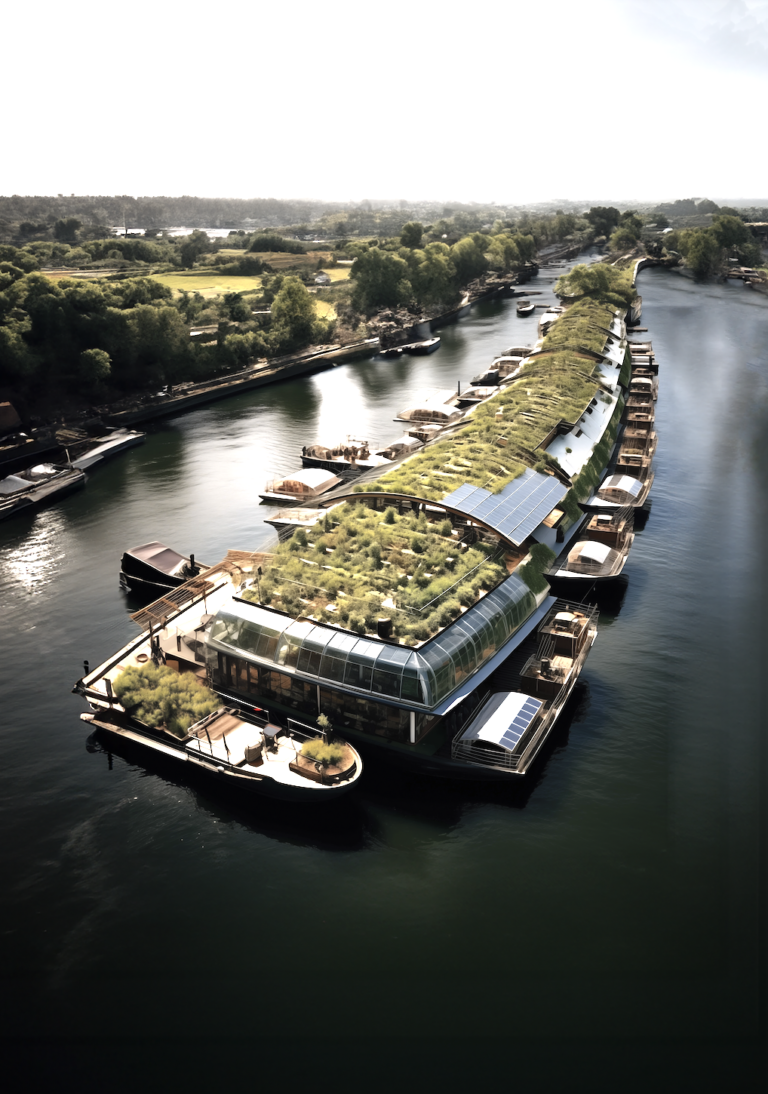
Barking and Dagenham, one of the most underserved boroughs in England, the easternmost borough of London, and a national urbanisation priority, faces impending changes, including the relocation of the Billingsgate Fish Market. This urban shift risks ecological loss, further community alienation from their natural ecosystems and also loss of access to low-barrier third spaces for residents.
This speculative design proposal envisions leveraging conservation efforts for the Freshwater Pearl Mussel Species to positively impact Barking’s socio-economic development. Over the next 40-50 years, this plan envisions a self-sufficient and sustainable network of reclaimedbarges, serving as versatile platforms to support recreational, conservational, communal, and agricultural spaces. The aim is to reimagine the urban development of Barking with minimal intrusion into the local ecology, fostering a sustainable and regenerative future while also serving a pivotal purpose in judging the impact of the Greater London Area on waterways and ecosystems around the world.
SECOND PLACE: HabiTide
Designed by Watanya Aekplakorn (MA Service Design), Claire Lee (MA Fashion), Ching Hang Ng (MA/MSc Innovation Design Engineering), Dawoon Yim (MA Design Products), Ruyi Yu (MA Textiles).
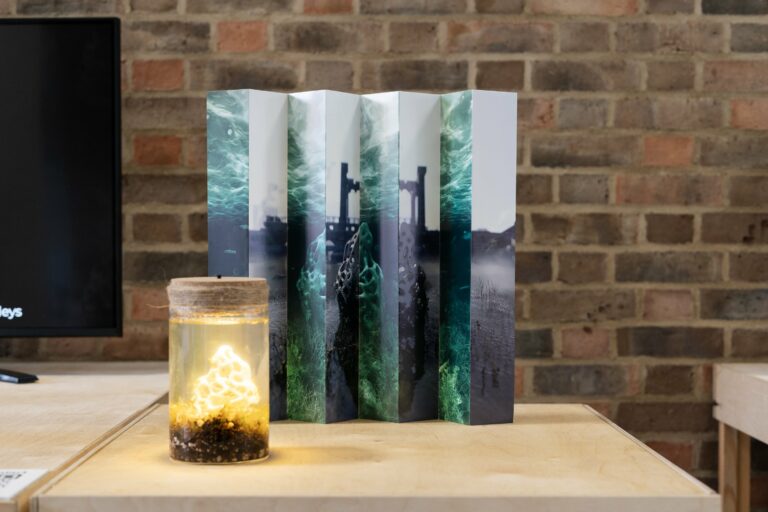
Deptford Creek stands as a distinctive eco-heritage site within Lewisham, constituting a mere 2% of the remaining natural Tidal Thames. Despite its unique status, human activities have destroyed crucial river habitats. In the 1990s, the removal of over 480 shopping trolleys inadvertently halved the fish population, as these structures served as vital refuges for young fish during tides. HabiTide proposes a sustainable solution: crafting biodegradable structures from fish bones, sodium alginate and clay. Drawing inspiration from both shopping trolleys and natural fish habitats, these organic shaped structures will be developed by collaboratingwith local seafood markets to repurpose fishbone waste.
These 3D-printed structures provide shelter for migratory freshwater fish while mitigating heavy metal contamination. Beyond functionality, the statues’ aesthetics will dynamically engage with local tides, fostering awareness about Deptford Creek’s ecological history and the looming challenges of rising sea levels.
THIRD PLACE: Bexley’s EELvolution
Designed by Raveena Rajesh Batham (MA Design Products), Lucy Katherine Bishop (MA Textiles), Minmin Ke (MA Fashion), Wen Xing (MA Intelligent Mobility), Xinyu Zhu (MA Service Design).
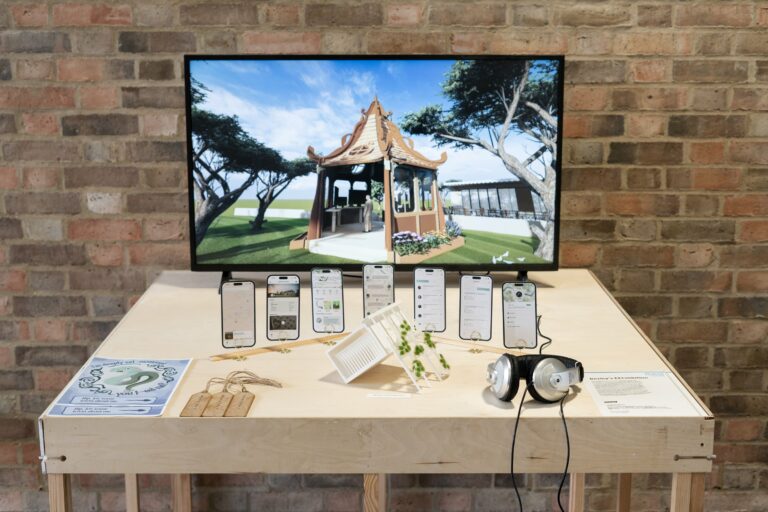
The bigger picture of this initiative extends beyond the mere construction of physical structures; it aims to cultivate widespread awareness about the plight of endangered eels in the river Cray, in Bexley. This educational campaign strives to resonate with individuals across diverse age groups, thereby fostering a collective understanding of the importance of conserving and protecting these vulnerable aquatic species. An urban design proposal along with an app design aspire to create a ripple effect of environmental consciousness, inspiring not only current generations but also instilling a sense of responsibility for the river’s ecological health in the generations to come.
The app proposal actively involves Bexley’s local community in eel conservation through real-time updates and educational content, while also encouraging participation and a sense of shared responsibility. With user-friendly features, it has the potential to create widespread awareness about the importance of protecting the river and its endangered eel population.
Two commendation awards have been given in the 2023/24 Grand Challenge. These are:
Special Commendation for Best Co-Design Project: 2049 Oceans Committee of Enfield
Designed by Anna Gao (MA Fashion), Kelly Harrigan (MA Design Products), Yiwen Tai (MA Service Design), Yixin Xu (MA Design Products), Xinyue Zhang (MA Textiles).
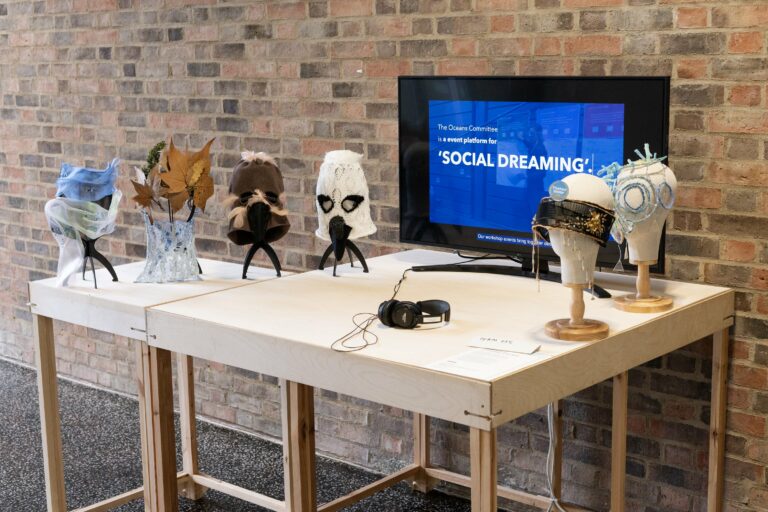
How do you engage more people in ocean science, no matter the distance from the coast? How do you encourage communities to imagine more creative and empathetic climate change initiatives? Most importantly: how do you democratise the design of cities, oceans and city futures for stakeholders who can’t speak for themselves? The Oceans Committee gives them a voice and an actual seat at the table to debate public policy. Co-design is key; not just with human citizens but with birds and rivers and oceans. This platform for ‘social dreaming’ is set in the year 2049. Two-hour role-playing workshops bring together designers and locals to speculate the futures we want for our cities and oceans.
Combining playful costumes, research-based characters, and public discourse, this semi-structured framework can be adapted to the stakeholders of different boroughs and cities across the world.
Special Commendation for Best Participatory Mapping: Aquatic Ecologist Scout Pack
Designed by Xiaotong Liu (MA Fashion), Daisy McClay (MA Textiles), Vishal Mehta (MA/MSc Innovation Design Engineering), Xiaozhuo Jiang (MA Service Design), Hongyu Wu (MA Design Products).
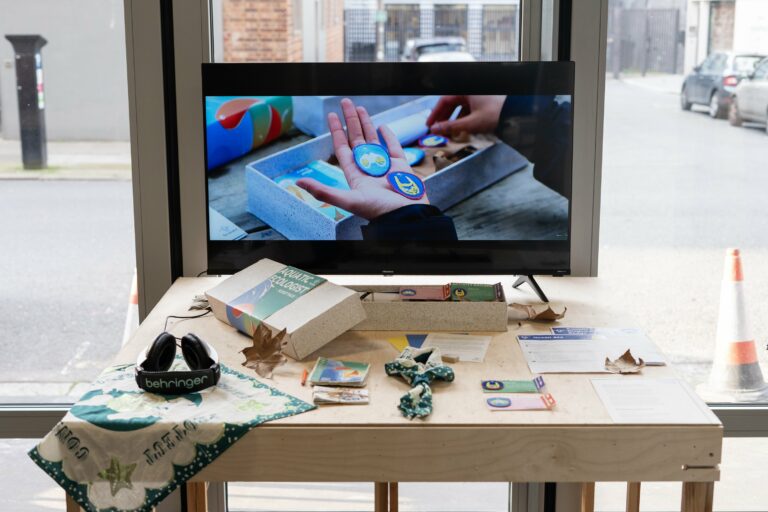
Being a Scout is about discovering the world on your own terms and making the most of what you have, wherever and whoever you are. With their motto in mind — “‘Preparing Young People for the World” — the Aquatic Ecologist Scout Pack is an introductory pitch to the Scouts to add more ocean-related activities and badges to their manifesto, while in keeping with their tried and tested framework. Targeting the age group of 10 1⁄2 to 14, the Aquatic Ecologist Scout Pack seeks to enhance ocean literacy, foster a sense of ownership, and provide valuable education. Through a thoughtfully curated blend of staged activities under the theme of Aquatic Ecology, and spontaneous initiatives termed Ocean Aid, our proposition goes beyond traditional scouting. The project envisions young Scouts proudly and confidently proclaiming, “The Scouts made me an Ocean citizen,” as they engage in immersive activities that cultivate environmental stewardship and a lifelong appreciation for our oceans.
“There was amazing energy and creativity shown from all the teams, and the approach taken to engage with stakeholder communities. From a DEFRA perspective, engagement with communities is key to achieving real impact in looking after our environment and the projects within the Ocean & Cities Grand Challenge represent superb examples of this activity. The winning team was a great example of ocean literacy, recycling and practical implementation, clearly recognising freshwater mussels as a keystone species and with the right management will also help address wider ecosystem and biodiversity challenges. The outputs from this project match the ambition of the UK Government’s 25 Year Environment plan and help to develop a strong community-based narrative around restoring nature.”
David Carlin, Chief Marine and Fisheries Scientist, DEFRA
Louis Demargne, Data & Knowledge Management Officer, Ocean Decade Coordination Unit, Intergovernmental Oceanographic Commission of UNESCO